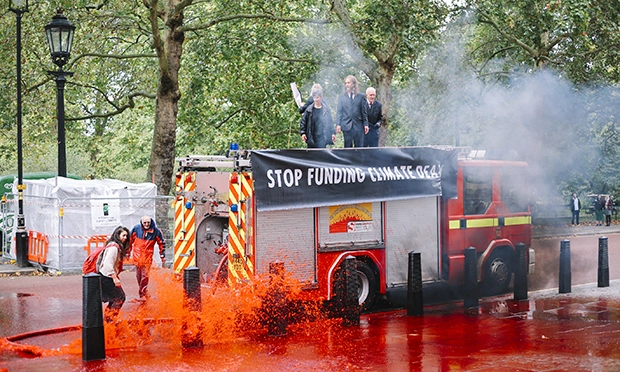Extinction Rebellion activist acquitted over Treasury fire engine protest

Protesters spray fake blood outside the Treasury in 2019. Photograph: The Lightscaper / Extinction Rebellion
Climate protester Rik Garfit-Mottram has been acquitted for his role in a protest in which fake blood was sprayed over the Treasury using a fire engine.
The Hackney sound engineer was one of the last two defendants to be acquitted for the 2019 protests in Westminster.
Garfit-Mottram was acquitted on 12 October after a four-week trial.
The 66-year-old former Sydney cabbie has lived in London since the late 1990s and has participated in Extinction Rebellion protests for the past six years.
On 3 October 2019, activists from the climate protest group Extinction Rebellion sprayed 1,800 litres of fake blood made of washable dye over the Treasury building, using a decommissioned fire engine.
This caused around £16,000 worth of damage on the building, Southwark Crown Court was told.
Following the lead of other courts, Justin Mark Cole banned those of the defendants who admitted causing damage from arguing their actions were necessary and proportionate.
The only defence they were able to put to the jury was that they believed the Treasury would have consented to the action if it had fully understood the circumstances.
Garfit-Mottram says his actions were deemed justified by an “understanding” jury.
The protest was in response to the Treasury’s funding of new fossil fuel projects in 2019 which directly opposed the globally agreed mission to keep global temperature rises below 1.5C, according to the campaign group.
Eight months after the fire engine incident, the funding from the Treasury was cancelled and Garfit-Mottram credits this to Extinction Rebellion’s impact.
When asked to justify his actions, Garfit-Mottram said: “I don’t just like blocking bridges – the human race is in deep trouble, I’ve known that since the 1970s. The climate crisis is one of the great threats of human existence other than nuclear war.”
Garfit-Mottram said he had “no regrets” about what he had done and that it was important to spark a conversation about the “imminent threat” posed by climate change.
“It’s sad we had to go so far,” he said, reflecting on the use of direct action in a democratic society.
Garfit-Mottram said the support of the public helped to obtain the not-guilty verdict: “I didn’t have to ramble on for hours to convince [the jury] of the climate crisis – they all bloody knew it.”
“In general, the public are incredibly supportive,” he added.
At the end of the trial, Judge Justin Mark Cole told the Crown Prosecution Service he did not consider further prosecutions for the action to be in the public interest.
Update: this article was amended at 11.50 am on 17 November 2023. It originally contained a photograph purporting to show Rik Garfit-Mottram, but was actually of a different defendant in the case. We apologise for any confusion caused.
